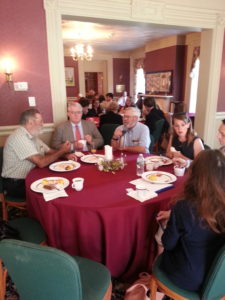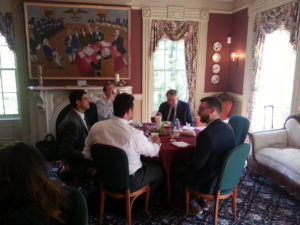The Alexander Hamilton Institute for the Study of Western Civilization (AHI) began the summer of its tenth year by hosting, June 15-17, the Ninth Annual Summer Conference with Baylor University’s Department of Political Science. Professor James W. Ceaser, Harry F. Byrd Professor of Politics at the University of Virginia, served as discussion leader on the theme “Defending the Constitution: The Federalist.” Attendance this year surpassed previous records and required extra seating at AHI headquarters in Clinton, New York. The audience included local citizens, undergraduates from Hamilton College and Colgate University, graduate students from Baylor University, and professors from Baylor University, Hamilton College, Colgate University, and several other colleges and universities across the country.
Dr. Ceaser, a distinguished constitutional scholar and political theorist, has published books on Presidential Selection (1979), Liberal Democracy and Political Science (1992), Reconstructing America: The Symbol of America in Modern Thought(2000), and Nature and History in American Political Development (2008). During five sessions, he and fourteen other panelists centered discussion on “Founding, What Makes a People?”; “Reasons and Requirements for Union”; “The Structure of the Federal Government”; and “Philosophical Points and General Theoretical Statements.” The Federalist consists of eighty-five essays published by Alexander Hamilton, James Madison, and John Jay under the pseudonym Publius in New York newspapers over a ten-month period, beginning in October 1787, to support the ratification of the Constitution. Thomas Jefferson called The Federalist, “the best commentary on the principles of government, which ever was written.” Panelists read and discussed thirty-five of the eighty-five essays.
Panelists included AHI co-founder and Hamilton College Professor of History Douglas Ambrose, AHI resident fellows David Frisk and Mary Grabar, Mary Nichols, Professor of Political Science at Baylor University, attorney Martha Martini, eight graduate students from Baylor University, and recent graduate Christine Basil, now teaching at Oglethorpe University.
Engaging and lively discussions during the day were followed by evening get-togethers over a barbecue dinner on nearby Hatch Lake at the cottage of Baylor professors and AHI senior fellows David and Mary Nichols. They have organized the summer conference since the summer of 2008, the first full year of AHI’s operation. Mary Nichols kicked off the conference with a welcoming address; Douglas Ambrose followed with remarks about the AHI’s mission and the literal and figurative “feasting” ahead. Each summer conference, Ambrose observed, is a feast in in the proper understanding of the word in that it represents “a gathering in community” that is enriching and ennobling. The shared goals, the pursuit of wisdom and truth, are accomplished through civil discourse and intellectual humility. “Let the feast begin!”
Professor Ceaser began by giving an overview of the circumstances that led to the writing of the essays that would become The Federalist. After the Constitutional Convention had ended on September 17, 1787, Alexander Hamilton discussed with John Jay the need to write a series of articles that would present the case for ratification. After Jay became ill, Hamilton teamed up with James Madison. All three wrote under the pseudonym “Publius,” after Publius Agricola, a founder of the Roman Republic. They wrote profoundly, yet with remarkable speed, responding to arguments by the anti-Federalists. In the beginning, the essays did not have a wide readership outside of New York, and there is little evidence that they were deployed by delegates at the state ratifying conventions. Still, as Professor Ceaser pointed out, the essays, though published with a sense of urgency, were also written with an eye for posterity. The meaning of a passage in Federalist #1—a passage that has become the epigraph for the AHI—engendered considerable commentary, particularly as it related to the ideas of American exceptionalism and universal rights: “It has been frequently remarked,” wrote Alexander Hamilton, “that it seems to have been reserved to the people of this country, by their conduct and example, to decide the important question, whether societies of men are really capable or not of establishing good government from reflection and choice, or whether they are forever destined to depend for their political constitutions on accident and force.”
Students and other participants benefited from the expertise of professors in attendance. Professor Ambrose, who specializes in Southern history and American religious thought, reminded colleagues of the Southern anti-Federalists’ worries about the government being sufficiently democratic. Their concerns were “Who are the ‘people’? The states or people as an aggregate?” The anti-Federalists sought to maintain a confederated union; the idea of a centralizing national government worried them, especially as presaged by John Jay in Federalist #2. The liveliest debate during the conference ensued about the extent to which the founders opposed slavery. Mary Nichols, an authority on Greek political thought, compared the founders’ ideas to those of Aristotle, and noted such innovations as an expiration of powers and the shift in opinion away from the notion that elections are inherently aristocratic. To preempt anti-Federalist criticism, The Federalistemphasizes the safeguards built into the Constitution’s architecture, such as relegating the power to declare war to the deliberative body of the legislature and the separation of powers.
Questions from the audience, a feature of AHI conferences, proved numerous and thoughtful. At the end of the final session, David Nichols thanked the AHI for the “wonderful opportunity” for learning and intellectual growth provided by the conference. “The main reason we do this,” he stressed, “is for students. The students always make me proud.” David Clinton, chairman of the Department of Political Science at Baylor University, attended the conference, and David Nichols recalled that both he and Dr. Clinton were nurtured as graduate students in the 1970s by Jim Ceaser. Professor Ceaser’s ability “to bring out the best in people,” Dr. Nichols noted, “remains.” In closing, AHI Executive Director Robert Paquette agreed with Professor Nichols’s assessment, noting that Professor Ceaser “combines deep learning and charm” and is never—pun intended—imperious. He thanked everyone and Ceaser in particular for his superb “encore performance” as the first two-time discussion leader of the summer conference.
Mary Nichols, who has played an important role in building Baylor’s graduate program in political science into one of the best in the country, officially retired in 2016. David Nichols’ retirement is “on the horizon.” To honor both of them for their friendship and their stalwart support of the AHI over the years, Professor Paquette bestowed an inscribed copy of, The Denmark Vesey Affair: A Documentary History, a definitive study of a seminal event in southern history. Citing Proverbs 20:11, “Even a child is known by his doings,” Paquette turned to the participants and said of Mary and David, “Their most important ‘doings’ are sitting at this table, in the audience, and in political science departments around the country. That incredible network of students nurtured by the Nichols speaks volumes about the impressive and lasting quality of their doings.”
Jerome Foss recently attained tenure in the Department of Political Science at St. Vincent College in Latrobe, Pennsylvania, and numbers among the many trained by Mary and David Nichols. He has participated for several years in the Annual Summer Conference. While a graduate student, he served twice as a panelist. This year, he returned for a seat in the audience and found at the conference two of his former undergraduate students: Jacob Boros and Ben Slomski, both of whom are now graduate students in Baylor’s political science program.
“I always enjoy the AHI/Baylor summer conferences,” said Professor Foss. “The topics are always great, the discussions are always fruitful, and the opportunity to see old friends is always priceless.”
Some students have received inspiration for their scholarship. Debbie O’Malley who returned for the fifth year, this year as a panelist, described how the 2014 conference on Democracy in Americainspired a new direction for her dissertation, “Religious Institutions and Associational Freedom in U.S. Supreme Court Jurisprudence,” which she is now writing. AHI undergraduate fellow and 2017 summer resident intern, Andrew Juchno, also attended and continues the tradition of involvement by AHI undergraduate fellows. He assisted Professor Paquette in multiple tasks in preparation for the event, and as part of his summer reading, read all eighty-five essays in The Federalist. He found the conference to be “particularly lively” and appreciated the way “Professor Ceaser facilitated the conversation by allowing participants to speak freely and engage with one another. I particularly enjoyed the debate on the extent to which the Constitution is an abolitionist document and Professor Ceaser’s talk on degeneracy theory,” the theory combatted fiercely by Thomas Jefferson that things born and raised in the New World were markedly inferior to those born and raised in the Old World.
For Dr. Frank Price, a former biology professor, who has participated in several AHI continuing education classes and events, the conference offered another cherished continuing education experience. “I really enjoyed the perspectives on the incredibly innovative thinking behind the Constitution and its defense,” he effused, “as well as the insights into the conflicts and debates between the authors and within the individual authors’ minds. As a scientist I was intrigued by the similarities of the way the founders crafted the constitution to the way science operates —it really began to seem analogous to an experimental protocol. The fundamental question was (and still is) how can a large, dispersed population govern itself? The checks and balances built into the constitution look very much like the way scientists balance variables in an experimental design. What an incredible achievement!”
By Mary Grabar, AHI Resident Fellow



Leave A Comment